Related Research Articles

Moore Street is a street in central Dublin, Ireland, off Henry Street, one of Ireland's main shopping streets. The famous Moore Street open-air fruit and vegetable market is Dublin's oldest food market. The market there is a famous landmark on the northside of the city.

The post-2008 Irish economic downturn in the Republic of Ireland, coincided with a series of banking scandals, followed the 1990s and 2000s Celtic Tiger period of rapid real economic growth fuelled by foreign direct investment, a subsequent property bubble which rendered the real economy uncompetitive, and an expansion in bank lending in the early 2000s. An initial slowdown in economic growth amid the international financial crisis of 2007–08 greatly intensified in late 2008 and the country fell into recession for the first time since the 1980s. Emigration, as did unemployment, escalated to levels not seen since that decade.
Brian Joseph Lenihan was an Irish Fianna Fáil politician who served as Minister for Finance from 2008 to 2011, Deputy Leader of Fianna Fáil from March 2011 to June 2011, Minister for Justice, Equality and Law Reform from 2007 to 2008 and Minister of State for Children from 2002 to 2007. He served as a Teachta Dála (TD) for the Dublin West constituency from 1996 to 2011.
Events during the year 2011 in Ireland.
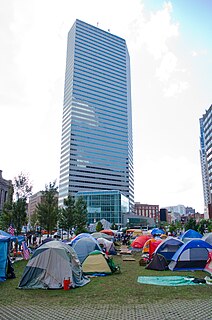
Occupy Boston was a collective of protesters that settled on September 30, 2011 in Boston, Massachusetts, on Dewey Square in the Financial District opposite the Federal Reserve Bank of Boston. It is related to the Occupy Wall Street movement that began in New York City on September 17, 2011.

The Occupy movement is an international progressive socio-political movement that expresses opposition to social and economic inequality and to the lack of "real democracy" around the world. It aims primarily to advance social and economic justice and new forms of democracy. The movement has had many different scopes, since local groups often had different focuses, but its prime concerns included how large corporations control the world in a way that disproportionately benefits a minority, undermines democracy and causes instability.
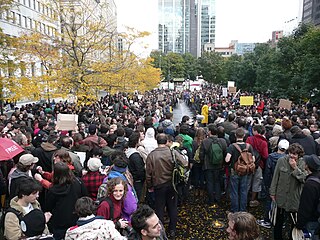
Occupy Canada was a collective of peaceful protests and demonstrations that were part of the larger Occupy Together movement which first manifested in the financial district of New York City with Occupy Wall Street, and subsequently spread to over 900 cities around the world.

Occupy London was a movement for social justice and real democracy in London, England, and part of the international Occupy movement. While some media described it as an "anti-capitalist" movement, in the statement written and endorsed by consensus by the Occupy assembly in the first two days of the occupation, occupiers defined themselves as a movement working to create alternatives to an "unjust and undemocratic" system. A second statement endorsed the following day called for "real global democracy". Due to a pre-emptive injunction, the protesters were prevented from their original aim to camp outside the London Stock Exchange. Instead, a camp was set up nearby next to St Paul's Cathedral. On 18 January 2012, Mr Justice Lindblom granted an injunction against continuation of the protest but the protesters remained in place pending an appeal. The appeal was refused on 22 February, and just past midnight on 28 February bailiffs supported by City of London police began to remove the tents.
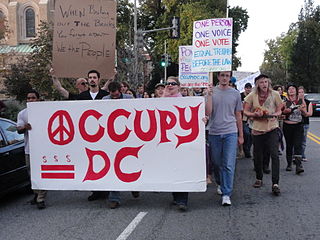
Occupy D.C. was an occupation of public space in Washington, D.C. based at McPherson Square and connected to the Occupy movements that sprung up across the United States in Fall 2011. The group had been demonstrating in McPherson Square since October 1, 2011, and in Freedom Plaza since October 6. Despite crackdowns on other Occupy projects across the country, federal authorities claimed on November 15 that they have no plans to clear McPherson Square Park. The National Park Service decided against eviction after meeting with activists and discussing health and safety conditions.

The Occupy movement began in the United States initially with the Occupy Wall Street protests but spread to many other cities, both in the United States and worldwide. This list article is a summary of occupy events that have occurred in cities in the United States.
Occupy The Rose Parade (OTRP) was a four phase Occupy demonstration and protest by approximately 10,000 Occupy Movement activists that was held on January 1 and January 2, 2012 as part of the Occupy movement at the Tournament of Roses Parade in Pasadena, California held on January 2, 2012. The main organizer of the 2012 OTRP, Pete Thottam, is a Los Angeles based Occupy volunteer, attorney and longtime antiwar activist. Phase 1 of the demonstration was on Sunday, January 1. It was organized by a separate group from the Occupy Pasadena group protesting locally, with no affiliation or endorsement between the two although a number of members of Occupy Pasadena actively participated in and helped organize the Occupy The Rose Parade demonstration. Rose Parade and Pasadena officials authorized the Occupy the Rose Parade movement to march at the end of the parade, after all the floats have passed and the phalanx of police cars moves through, but while the crowd is still in place.
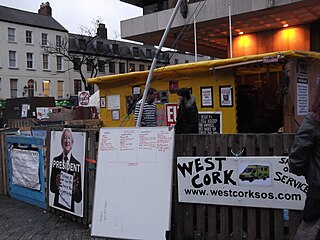
Occupy Dame Street or Occupy Dublin was a peaceful protest and demonstration against economic inequality, social injustice and corporate greed taking place outside the Central Bank of Ireland plaza on Dame Street in Dublin, beside the Temple Bar area of the city. Part of the global Occupy movement, it took its name from the Occupy Wall Street demonstration in New York City's Wall Street financial district. Occupy Dame Street had four requests: the withdrawal of the EU/IMF from Ireland, an end to public ownership of private debt, the return to public ownership of Ireland's privatised oil and gas reserves, and the implementation of what the movement describes as "real participatory democracy". The national police force, Garda Síochána, dismantled their camp during a late-night raid on 8 March 2012. The protesters vowed to fight on. Some were never heard of again, while others found other channels of protest. The most detailed account and analysis of events was written by Helena Sheehan.

Occupy Sydney was a social movement and protest as part of the global Occupy movements, in Sydney, Australia. The occupation began on 15 October 2011 outside the Reserve Bank of Australia in Martin Place. The Martin Place occupation was first evicted by NSW Police on 23 October 2011. This eviction and later police action was named Operation Goulding. Another eviction attempt occurred on 2 February 2012. The protest site was removed five times in early July 2013, only to re-establish itself each time within hours.
Events during the year 2012 in Ireland.
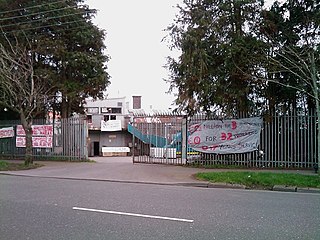
The Vita Cortex sit-in was a peaceful protest at the Vita Cortex plant on the Kinsale Road in Cork, Ireland, which began on 16 December 2011 after workers were made redundant without pay with immediate effect. The dispute led to nationwide protests, television appeals and debates in Dáil Éireann. According to the trade union UNITE, the dispute was part of a growing trend of workers being "left in the cold" after being made redundant.
Occupy Bath was a protest group against economic inequality that began initially with an encampment on 30 October 2011 in Queen Square, Bath, England. The camp was dismantled on 10 December 2011. Occupy Bath described themselves as being "not all anti-capitalist" but rather "pro-economic fairness and pro-direct democracy". The camp held daily meetings, described by the group as general assemblies, which were open to the general public

The anti-austerity movement in Ireland saw major demonstrations from 2008 to 2015.

Oliver Plunkett Street is a shopping street in Cork, Ireland. It was originally laid-out in the early 18th century as the city expanded eastwards beyond the original city walls.

Grand Parade is one of the main streets of Cork city, Ireland. It runs from South Mall in the south to St. Patrick's Street/Daunt Square in the north, with intersections with Oliver Plunkett Street, Tuckey Street, Washington Street, Augustine Street and a number of pedestrian-only lanes in between. The Irish name of the street, Sráid an Chapaill Bhuí, comes from a time when there was a statue of King George II on horse-back at the junction with South Mall. The location of this statue is now occupied by the national monument.
References
- 1 2 O'Connell, Brian (3 January 2012). "Protesters take empty offices for community use". The Irish Times. Irish Times Trust. Retrieved 3 January 2012.
- 1 2 3 4 Hayes Curtin, Brian (5 January 2012). "Occupy squatters plan to be 'an example to the country'". Cork Independent. Archived from the original on 12 May 2012. Retrieved 5 January 2012.
- ↑ "Occupy Cork announces voluntary dismantling of protest camp". The Journal. 12 March 2012. Retrieved 20 June 2012.
- ↑ O'Connell, Brian (13 March 2012). "Occupy Cork protesters dismantle camp". The Irish Times. Retrieved 20 June 2012.
- ↑ O'Carroll, Daniel (4 January 2012). "Occupy Cork moves camp, as local councillor calls them attention seekers - VIDEO". Irish Central. Retrieved 4 January 2012.
- 1 2 3 Riegel, Ralph; McQuinn, Cormac (4 January 2012). "Protesters say Secret Santa gave them keys of empty €1m offices". Irish Independent. Independent News & Media. Retrieved 4 January 2012.
- ↑ Hayes Curtin, Brian (13 October 2011). "Occupy Cork protests to begin this Saturday". Cork Independent. Archived from the original on 5 January 2012. Retrieved 13 October 2011.
- ↑ "Protests held in Dublin, Cork". The Irish Times. Irish Times Trust. 15 October 2011. Retrieved 15 October 2011.
- ↑ "Occupy protest holds maths class in bank". Irish Examiner. 4 November 2011.
- 1 2 "Occupy movement takes over Cork building". RTÉ News. Raidió Teilifís Éireann. 3 January 2012. Retrieved 3 January 2012.
- ↑ "Group 'liberate' Nama building to become community centre". TheJournal.ie. 2 January 2012. Retrieved 2 January 2012.
- ↑ "Video: Cork protesters 'liberate Nama building'". TheJournal.ie. 3 January 2012. Retrieved 3 January 2012.
- ↑ Allen, Christine (3 January 2012). "Group occupies 'NAMA' building". Cork Independent. Archived from the original on 16 October 2012. Retrieved 3 January 2012.
- ↑ "Occupy Cork protesters dismantle camp". The Irish Times.
- 1 2 "Councillor: Occupy Cork group are 'attention seeking'". Irish Examiner. Thomas Crosbie Holdings. 4 January 2012. Retrieved 4 January 2012.